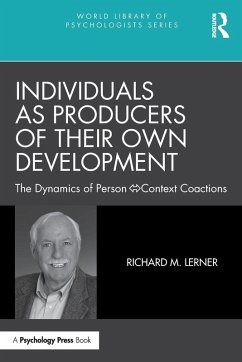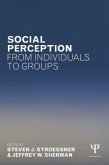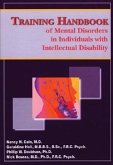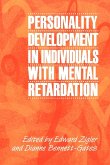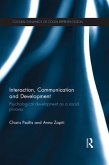Richard M. Lerner
Individuals as Producers of Their Own Development
The Dynamics of Person-Context Coactions
Richard M. Lerner
Individuals as Producers of Their Own Development
The Dynamics of Person-Context Coactions
- Broschiertes Buch
- Merkliste
- Auf die Merkliste
- Bewerten Bewerten
- Teilen
- Produkt teilen
- Produkterinnerung
- Produkterinnerung
In this series, experts present collections of what they judge to be their most interesting publications. Professor Richard M. Lerner has been prominent in the application of developmental science across the lifespan, investigating relational development systems and their impact on positive youth development (PYD) and social justice.
Andere Kunden interessierten sich auch für
![Five Steps to Strengthen Ethics in Organizations and Individuals Five Steps to Strengthen Ethics in Organizations and Individuals]() Kenneth S. PopeFive Steps to Strengthen Ethics in Organizations and Individuals34,99 €
Kenneth S. PopeFive Steps to Strengthen Ethics in Organizations and Individuals34,99 €![Social Perception from Individuals to Groups Social Perception from Individuals to Groups]() Social Perception from Individuals to Groups80,99 €
Social Perception from Individuals to Groups80,99 €![Training Handbook of Mental Disorders in Individuals with Intellectual Disabilities Training Handbook of Mental Disorders in Individuals with Intellectual Disabilities]() Training Handbook of Mental Disorders in Individuals with Intellectual Disabilities50,99 €
Training Handbook of Mental Disorders in Individuals with Intellectual Disabilities50,99 €![Suicide and Eating Disordered Behavior Among Individuals of African Descent Suicide and Eating Disordered Behavior Among Individuals of African Descent]() Daniel Leighton HollarSuicide and Eating Disordered Behavior Among Individuals of African Descent19,99 €
Daniel Leighton HollarSuicide and Eating Disordered Behavior Among Individuals of African Descent19,99 €![Personality Development in Individuals with Mental Retardation Personality Development in Individuals with Mental Retardation]() Edward Zigler / Dianne Bennett-Gates (eds.)Personality Development in Individuals with Mental Retardation41,99 €
Edward Zigler / Dianne Bennett-Gates (eds.)Personality Development in Individuals with Mental Retardation41,99 €![Children as Agents in Their Worlds Children as Agents in Their Worlds]() Sheila GreeneChildren as Agents in Their Worlds63,99 €
Sheila GreeneChildren as Agents in Their Worlds63,99 €![Interaction, Communication and Development Interaction, Communication and Development]() Charis PsaltisInteraction, Communication and Development80,99 €
Charis PsaltisInteraction, Communication and Development80,99 €-
-
-
In this series, experts present collections of what they judge to be their most interesting publications. Professor Richard M. Lerner has been prominent in the application of developmental science across the lifespan, investigating relational development systems and their impact on positive youth development (PYD) and social justice.
Hinweis: Dieser Artikel kann nur an eine deutsche Lieferadresse ausgeliefert werden.
Hinweis: Dieser Artikel kann nur an eine deutsche Lieferadresse ausgeliefert werden.
Produktdetails
- Produktdetails
- Verlag: Routledge
- Seitenzahl: 406
- Erscheinungstermin: 26. August 2024
- Englisch
- Abmessung: 229mm x 152mm x 22mm
- Gewicht: 586g
- ISBN-13: 9780367544645
- ISBN-10: 0367544644
- Artikelnr.: 71231487
- Herstellerkennzeichnung
- Produktsicherheitsverantwortliche/r
- Europaallee 1
- 36244 Bad Hersfeld
- gpsr@libri.de
- Verlag: Routledge
- Seitenzahl: 406
- Erscheinungstermin: 26. August 2024
- Englisch
- Abmessung: 229mm x 152mm x 22mm
- Gewicht: 586g
- ISBN-13: 9780367544645
- ISBN-10: 0367544644
- Artikelnr.: 71231487
- Herstellerkennzeichnung
- Produktsicherheitsverantwortliche/r
- Europaallee 1
- 36244 Bad Hersfeld
- gpsr@libri.de
Richard M. Lerner is the Bergstrom Chair in Applied Developmental Science and the Director of the Institute for Applied Research in Youth Development in the Eliot Pearson Department of Child Study and Human Development, at Tufts University. He has authored more than 700 scholarly publications, including more than 80 authored or edited books, and was founding editor of the Journal of Research on Adolescence and of Applied Developmental Science . His honors include the American Psychological Association's (Division 7) Urie Bronfenbrenner Award for Lifetime Contribution to Developmental Psychology in the Service of Science and Society, 2013; the Society for Research in Child Development Award for Distinguished Contributions to Public Policy & Practice in Child Development, 2017, and the International Society for the Study of Behavioral Development Award for Applications of Behavioral Development Theory and Research, 2018.
Part I. Introduction: Development As Individual Context Relations Across Time and Place Part II. Empirical Beginnings Lerner
R. M.
& Korn
S. J. (1972). The development of body-build stereotypes in males. Lerner
R. M.
& Lerner
J. V. (1977). Effects of age
sex
and physical attractiveness on child-peer relations
academic performance
and elementary school adjustment. Part III. The Evolution of Dynamic
Relational Developmental Systems-Based Models Lerner
R. M. (1978). Nature
nurture
and dynamic interactionism. Lerner
R. M. (1982). Children and adolescents as producers of their own development. Lerner
R. M. (1991). Changing organism-context relations as the basic process of development: A developmental contextual perspective. Lerner
R. M. (1996). Relative plasticity
integration
temporality
and diversity in human development: A developmental contextual perspective about theory
process
and method. Lerner
R. M.
Agans
J. P.
DeSouza
L. M.
& Hershberg
R. M. (2014). Developmental science in 2025: A predictive review. Lerner
R. M.
Lerner
J. V.
& Chase
P. A. (2019). Toward enhancing the role of idiographic-based analyses in describing
explaining
and optimizing the study of human development: The sample case of adolescent family relationships. Part IV. Theory-Predicated Applications of Developmental Science and the Positive Youth Development Perspective Lerner
R. M.
Fisher
C. B.
& Weinberg
R. A. (2000). Toward a science for and of the people: Promoting civil society through the application of developmental science. Lerner
R. M.
Fisher
C. B.
& Weinberg
R. A. (2000). Applying developmental science in the 21st century: International scholarship for our times. Jelicic
H.
Bobek
D. L.
Phelps
E.
Lerner
R.M.
& Lerner
J. V. (2007). Using positive youth development to predict contribution and risk behaviors in early adolescence: Findings from the first two waves of the 4-H Study of Positive Youth Development. Lerner
R. M.
Tirrell
J. M.
Dowling
E. M.
Geldhof
J.
Gestsdóttir
S.
Lerner
J. V.
King
P. E.
Williams
K.
Iraheta
G.
& Sim
A. T. R. (2018). The end of the beginning: Evidence and absences studying PYD in a global context. Lerner
R. M. (2018). Character development among youth: Linking lives in time and place. Part V. Exposing the Counterfactual Nature of Genetic Reductionism Lerner
R. M.
& von Eye
A. (1992). Sociobiology and human development: Arguments and evidence. Lerner
R. M. (2015). Eliminating genetic reductionism from developmental science. Lerner
R. M. (2016). Complexity embraced and complexity reduced: A tale of two approaches to human development: Commentary on Witherington and Lickliter. Lerner
R. M.
& Overton
W. F. (2017). Reduction to absurdity: Why epigenetics invalidates all models involving genetic reduction. Part VI. Developmental Theory and the Promotion of Social Justice Lerner
R. M.
& Overton
W. F. (2008). Exemplifying the integrations of the relational developmental system: Synthesizing theory
research
and application to promote positive development and social justice. Lerner
R. M. (2015). Promoting social justice by rejecting genetic reductionism: A challenge for developmental science. Lerner
R. M. (2017). Promoting positive development
health
and social justice through dismantling genetic determinism.
R. M.
& Korn
S. J. (1972). The development of body-build stereotypes in males. Lerner
R. M.
& Lerner
J. V. (1977). Effects of age
sex
and physical attractiveness on child-peer relations
academic performance
and elementary school adjustment. Part III. The Evolution of Dynamic
Relational Developmental Systems-Based Models Lerner
R. M. (1978). Nature
nurture
and dynamic interactionism. Lerner
R. M. (1982). Children and adolescents as producers of their own development. Lerner
R. M. (1991). Changing organism-context relations as the basic process of development: A developmental contextual perspective. Lerner
R. M. (1996). Relative plasticity
integration
temporality
and diversity in human development: A developmental contextual perspective about theory
process
and method. Lerner
R. M.
Agans
J. P.
DeSouza
L. M.
& Hershberg
R. M. (2014). Developmental science in 2025: A predictive review. Lerner
R. M.
Lerner
J. V.
& Chase
P. A. (2019). Toward enhancing the role of idiographic-based analyses in describing
explaining
and optimizing the study of human development: The sample case of adolescent family relationships. Part IV. Theory-Predicated Applications of Developmental Science and the Positive Youth Development Perspective Lerner
R. M.
Fisher
C. B.
& Weinberg
R. A. (2000). Toward a science for and of the people: Promoting civil society through the application of developmental science. Lerner
R. M.
Fisher
C. B.
& Weinberg
R. A. (2000). Applying developmental science in the 21st century: International scholarship for our times. Jelicic
H.
Bobek
D. L.
Phelps
E.
Lerner
R.M.
& Lerner
J. V. (2007). Using positive youth development to predict contribution and risk behaviors in early adolescence: Findings from the first two waves of the 4-H Study of Positive Youth Development. Lerner
R. M.
Tirrell
J. M.
Dowling
E. M.
Geldhof
J.
Gestsdóttir
S.
Lerner
J. V.
King
P. E.
Williams
K.
Iraheta
G.
& Sim
A. T. R. (2018). The end of the beginning: Evidence and absences studying PYD in a global context. Lerner
R. M. (2018). Character development among youth: Linking lives in time and place. Part V. Exposing the Counterfactual Nature of Genetic Reductionism Lerner
R. M.
& von Eye
A. (1992). Sociobiology and human development: Arguments and evidence. Lerner
R. M. (2015). Eliminating genetic reductionism from developmental science. Lerner
R. M. (2016). Complexity embraced and complexity reduced: A tale of two approaches to human development: Commentary on Witherington and Lickliter. Lerner
R. M.
& Overton
W. F. (2017). Reduction to absurdity: Why epigenetics invalidates all models involving genetic reduction. Part VI. Developmental Theory and the Promotion of Social Justice Lerner
R. M.
& Overton
W. F. (2008). Exemplifying the integrations of the relational developmental system: Synthesizing theory
research
and application to promote positive development and social justice. Lerner
R. M. (2015). Promoting social justice by rejecting genetic reductionism: A challenge for developmental science. Lerner
R. M. (2017). Promoting positive development
health
and social justice through dismantling genetic determinism.
Part I. Introduction: Development As Individual Context Relations Across Time and Place Part II. Empirical Beginnings Lerner
R. M.
& Korn
S. J. (1972). The development of body-build stereotypes in males. Lerner
R. M.
& Lerner
J. V. (1977). Effects of age
sex
and physical attractiveness on child-peer relations
academic performance
and elementary school adjustment. Part III. The Evolution of Dynamic
Relational Developmental Systems-Based Models Lerner
R. M. (1978). Nature
nurture
and dynamic interactionism. Lerner
R. M. (1982). Children and adolescents as producers of their own development. Lerner
R. M. (1991). Changing organism-context relations as the basic process of development: A developmental contextual perspective. Lerner
R. M. (1996). Relative plasticity
integration
temporality
and diversity in human development: A developmental contextual perspective about theory
process
and method. Lerner
R. M.
Agans
J. P.
DeSouza
L. M.
& Hershberg
R. M. (2014). Developmental science in 2025: A predictive review. Lerner
R. M.
Lerner
J. V.
& Chase
P. A. (2019). Toward enhancing the role of idiographic-based analyses in describing
explaining
and optimizing the study of human development: The sample case of adolescent family relationships. Part IV. Theory-Predicated Applications of Developmental Science and the Positive Youth Development Perspective Lerner
R. M.
Fisher
C. B.
& Weinberg
R. A. (2000). Toward a science for and of the people: Promoting civil society through the application of developmental science. Lerner
R. M.
Fisher
C. B.
& Weinberg
R. A. (2000). Applying developmental science in the 21st century: International scholarship for our times. Jelicic
H.
Bobek
D. L.
Phelps
E.
Lerner
R.M.
& Lerner
J. V. (2007). Using positive youth development to predict contribution and risk behaviors in early adolescence: Findings from the first two waves of the 4-H Study of Positive Youth Development. Lerner
R. M.
Tirrell
J. M.
Dowling
E. M.
Geldhof
J.
Gestsdóttir
S.
Lerner
J. V.
King
P. E.
Williams
K.
Iraheta
G.
& Sim
A. T. R. (2018). The end of the beginning: Evidence and absences studying PYD in a global context. Lerner
R. M. (2018). Character development among youth: Linking lives in time and place. Part V. Exposing the Counterfactual Nature of Genetic Reductionism Lerner
R. M.
& von Eye
A. (1992). Sociobiology and human development: Arguments and evidence. Lerner
R. M. (2015). Eliminating genetic reductionism from developmental science. Lerner
R. M. (2016). Complexity embraced and complexity reduced: A tale of two approaches to human development: Commentary on Witherington and Lickliter. Lerner
R. M.
& Overton
W. F. (2017). Reduction to absurdity: Why epigenetics invalidates all models involving genetic reduction. Part VI. Developmental Theory and the Promotion of Social Justice Lerner
R. M.
& Overton
W. F. (2008). Exemplifying the integrations of the relational developmental system: Synthesizing theory
research
and application to promote positive development and social justice. Lerner
R. M. (2015). Promoting social justice by rejecting genetic reductionism: A challenge for developmental science. Lerner
R. M. (2017). Promoting positive development
health
and social justice through dismantling genetic determinism.
R. M.
& Korn
S. J. (1972). The development of body-build stereotypes in males. Lerner
R. M.
& Lerner
J. V. (1977). Effects of age
sex
and physical attractiveness on child-peer relations
academic performance
and elementary school adjustment. Part III. The Evolution of Dynamic
Relational Developmental Systems-Based Models Lerner
R. M. (1978). Nature
nurture
and dynamic interactionism. Lerner
R. M. (1982). Children and adolescents as producers of their own development. Lerner
R. M. (1991). Changing organism-context relations as the basic process of development: A developmental contextual perspective. Lerner
R. M. (1996). Relative plasticity
integration
temporality
and diversity in human development: A developmental contextual perspective about theory
process
and method. Lerner
R. M.
Agans
J. P.
DeSouza
L. M.
& Hershberg
R. M. (2014). Developmental science in 2025: A predictive review. Lerner
R. M.
Lerner
J. V.
& Chase
P. A. (2019). Toward enhancing the role of idiographic-based analyses in describing
explaining
and optimizing the study of human development: The sample case of adolescent family relationships. Part IV. Theory-Predicated Applications of Developmental Science and the Positive Youth Development Perspective Lerner
R. M.
Fisher
C. B.
& Weinberg
R. A. (2000). Toward a science for and of the people: Promoting civil society through the application of developmental science. Lerner
R. M.
Fisher
C. B.
& Weinberg
R. A. (2000). Applying developmental science in the 21st century: International scholarship for our times. Jelicic
H.
Bobek
D. L.
Phelps
E.
Lerner
R.M.
& Lerner
J. V. (2007). Using positive youth development to predict contribution and risk behaviors in early adolescence: Findings from the first two waves of the 4-H Study of Positive Youth Development. Lerner
R. M.
Tirrell
J. M.
Dowling
E. M.
Geldhof
J.
Gestsdóttir
S.
Lerner
J. V.
King
P. E.
Williams
K.
Iraheta
G.
& Sim
A. T. R. (2018). The end of the beginning: Evidence and absences studying PYD in a global context. Lerner
R. M. (2018). Character development among youth: Linking lives in time and place. Part V. Exposing the Counterfactual Nature of Genetic Reductionism Lerner
R. M.
& von Eye
A. (1992). Sociobiology and human development: Arguments and evidence. Lerner
R. M. (2015). Eliminating genetic reductionism from developmental science. Lerner
R. M. (2016). Complexity embraced and complexity reduced: A tale of two approaches to human development: Commentary on Witherington and Lickliter. Lerner
R. M.
& Overton
W. F. (2017). Reduction to absurdity: Why epigenetics invalidates all models involving genetic reduction. Part VI. Developmental Theory and the Promotion of Social Justice Lerner
R. M.
& Overton
W. F. (2008). Exemplifying the integrations of the relational developmental system: Synthesizing theory
research
and application to promote positive development and social justice. Lerner
R. M. (2015). Promoting social justice by rejecting genetic reductionism: A challenge for developmental science. Lerner
R. M. (2017). Promoting positive development
health
and social justice through dismantling genetic determinism.

